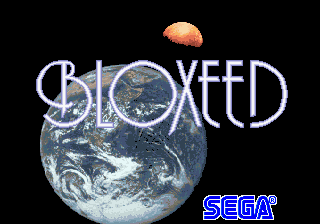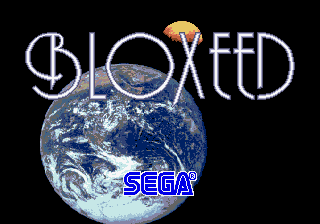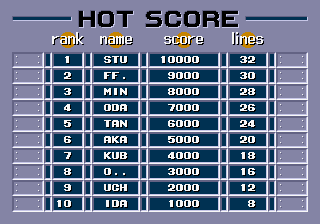Difference between revisions of "Bloxeed"
From Sega Retro
| (18 intermediate revisions by 5 users not shown) | |||
| Line 1: | Line 1: | ||
{{Bob | {{Bob | ||
| − | | bobscreen= | + | | bobscreen=Bloxeed System18TitleScreen.png |
| + | | bobscreen2=Bloxeed SystemC Title.png | ||
| + | | tab1=System 18/16 | ||
| + | | tab2=System C | ||
| publisher=[[Sega]] | | publisher=[[Sega]] | ||
| − | | developer=[[Sega | + | | developer=[[Sega R&D 1]] (System 18: [[Esco Boueki]]?) |
| system=[[System 18]], [[System 16]], [[System C]] | | system=[[System 18]], [[System 16]], [[System C]] | ||
| + | | players=1-2 | ||
| genre=Puzzle | | genre=Puzzle | ||
| − | | releases={{ | + | | releases={{releasesArcade |
| − | | | + | | sysc_date_us=1989 |
| − | | | + | | sysc_date_jp=1989 |
| − | | | + | | sys18_date_jp=1989 |
| − | | | + | | sys16_date_jp=1989 |
}} | }} | ||
}} | }} | ||
| − | + | '''''{{PAGENAME}}''''' (ブロクシード) is a 1989 arcade puzzle game by [[Sega]] based on the gameplay seen in ''[[Tetris]]''. It was first released exclusively in Japan on [[System 18]] hardware before Sega ported it to their [[System C]] hardware for international release (and was the first System C game to be released). | |
| − | ''''' | ||
==Gameplay== | ==Gameplay== | ||
| − | ''Bloxeed'' | + | [[Image:Bloxeed System18 Gameplay.png|thumb|right|200px|Gameplay screenshot from the System 18 version.]] |
| − | + | ''Bloxeed'' is an extension of the ''Tetris'' formula. The objective remains the same - to clear lines with falling Tetrimino pieces, however ''Bloxeed'' expands the ways in which to do so by introducing "Power Blocks" - blocks with letters or numbers printed on them. If a cleared line contains a Power Block, the player is rewarded with 5,000 points and a power-up that allows them to strategically add/remove blocks: | |
| − | + | ||
| − | + | {{InfoTable| | |
| − | + | {{InfoRow | |
| − | + | | title=Flicky | |
| − | + | | sprite={{sprite|Bloxeed sprites.png|3|crop_width=17|crop_height=17|crop_x=0}} | |
| + | | desc=By pressing one of the rotate buttons, players can drop blocks directly below Flicky (from ''[[Flicky]]''). Like Tetriminos, Flicky falls one row at a time, and disappears upon reaching the bottom. | ||
| + | }} | ||
| + | {{InfoRow | ||
| + | | title=Satellite/Shot | ||
| + | | sprite={{sprite|Bloxeed sprites.png|3|crop_width=17|crop_height=17|crop_x=17}} | ||
| + | | desc=By pressing one of the rotate buttons, players can shoot at and clear blocks directly below a satellite. This is similar to Flicky, but in reverse. If the player destroys all of the blocks in the matrix, the power-up immediately ends and the player is awarded a large bonus. | ||
| + | }} | ||
| + | {{InfoRow | ||
| + | | title=Bomb | ||
| + | | sprite={{sprite|Bloxeed sprites.png|3|crop_width=17|crop_height=17|crop_x=34}} | ||
| + | | desc=Destroy a chunk of blocks. | ||
| + | }} | ||
| + | {{InfoRow | ||
| + | | title=16 Ton | ||
| + | | sprite={{sprite|Bloxeed sprites.png|3|crop_width=17|crop_height=17|crop_x=51}} | ||
| + | | desc=Destroy three adjacent columns of blocks. | ||
| + | }} | ||
| + | {{InfoRow | ||
| + | | title=4 Lines | ||
| + | | sprite={{sprite|Bloxeed sprites.png|3|crop_width=17|crop_height=17|crop_x=68}} | ||
| + | | desc=Clear four randomly-selected rows, regardless of how complete they are. | ||
| + | }} | ||
| + | }} | ||
| + | |||
| + | After a certain period of time, an incomplete line is added to the bottom of the matrix. The amount of time until this happens is indicated by a gauge that turns red on the side of the matrix, and the rate that it builds up will increase with the player's level. Clearing a Power Block will reset the gauge and delay the addition of new lines. The scoring system remains the same as in ''Tetris'', and the background will change between images of scenery after reaching certain levels. | ||
| + | |||
| + | When playing with two players, both players have the choice of playing "Ordinary Mode", where they simply try to get a high score like in single-player without interfering with each other, and "VS. Mode". In VS. Mode, clearing two or more lines will knock whatever Tetrimino is currently falling in the opponent's play area out and send two incomplete lines back at them. Depending on DIP switch configuration, playing VS. Mode may require more credits than Ordinary Mode, or VS. Mode may not be available (System 18 version only; the System C version has no configuration to disable VS. Mode so it is always available). | ||
| + | |||
| + | ==History== | ||
| + | ===Legacy=== | ||
| + | Likely due to complications regarding ''Tetris'' licenses in the late 1980s and early 1990s, ''Bloxeed'' was not ported to any home platforms, as Sega lacked a license in order to do so. | ||
| + | |||
| + | Many years later, the game was packaged with ''Tetris'' and ''[[Flash Point]]'' in ''[[Sega Ages 2500 Series Vol. 28: Tetris Collection]]''. Both the System 18 and System C versions were included, along with a [[System 16]] version. | ||
| + | |||
| + | ===Production credits=== | ||
| + | ===System 16 version=== | ||
| + | {{creditstable| | ||
| + | * '''Music:''' [[Tohru Nakabayashi]]{{fileref|SS16CSTV3 Album JP Booklet.pdf|page=6}} | ||
| + | * '''Music Support:''' [[Keisuke Tsukahara (composer)|Keisuke Tsukahara]]{{fileref|SS16CSTV3 Album JP Booklet.pdf|page=6}} | ||
| + | | console=SYS16 | ||
| + | | source=Uncredited | ||
| + | }} | ||
| + | |||
| + | ===System C version=== | ||
| + | {{creditstable| | ||
| + | *'''STUFF.:''' MINODA, [[Kou Tanaka|TANAKA]], KUBO, [[Kenji Uchida|UCHIDA]] | ||
| + | | console=SYSC | ||
| + | | source=In-game high score table | ||
| + | | file=Bloxeed SystemC HotScore.png | ||
| + | }} | ||
==Magazine articles== | ==Magazine articles== | ||
{{mainArticle|{{PAGENAME}}/Magazine articles}} | {{mainArticle|{{PAGENAME}}/Magazine articles}} | ||
| + | |||
| + | ==Promotional material== | ||
| + | <gallery> | ||
| + | Bloxeed Arcade US Flyer.jpg|US flyer | ||
| + | </gallery> | ||
==Physical scans== | ==Physical scans== | ||
| Line 47: | Line 105: | ||
{{ScanArcade | {{ScanArcade | ||
| type=upright | | type=upright | ||
| − | | console=System | + | | console=System 16 |
| region=JP | | region=JP | ||
}} | }} | ||
==References== | ==References== | ||
| − | <references /> | + | <references/> |
| + | {{BloxeedOmni}} | ||
{{Tetris}} | {{Tetris}} | ||
| − | |||
| − | |||
| − | |||
Latest revision as of 15:57, 2 June 2024
| |||||||||||||||||||||
| Bloxeed | |||||||||||||||||||||
|---|---|---|---|---|---|---|---|---|---|---|---|---|---|---|---|---|---|---|---|---|---|
| System(s): System 18, System 16, System C | |||||||||||||||||||||
| Publisher: Sega | |||||||||||||||||||||
| Developer: Sega R&D 1 (System 18: Esco Boueki?) | |||||||||||||||||||||
| Genre: Puzzle | |||||||||||||||||||||
| Number of players: 1-2 | |||||||||||||||||||||
|
Bloxeed (ブロクシード) is a 1989 arcade puzzle game by Sega based on the gameplay seen in Tetris. It was first released exclusively in Japan on System 18 hardware before Sega ported it to their System C hardware for international release (and was the first System C game to be released).
Contents
Gameplay
Bloxeed is an extension of the Tetris formula. The objective remains the same - to clear lines with falling Tetrimino pieces, however Bloxeed expands the ways in which to do so by introducing "Power Blocks" - blocks with letters or numbers printed on them. If a cleared line contains a Power Block, the player is rewarded with 5,000 points and a power-up that allows them to strategically add/remove blocks:
| Flicky | |
|---|---|
| By pressing one of the rotate buttons, players can drop blocks directly below Flicky (from Flicky). Like Tetriminos, Flicky falls one row at a time, and disappears upon reaching the bottom. | |
| Satellite/Shot | |
| By pressing one of the rotate buttons, players can shoot at and clear blocks directly below a satellite. This is similar to Flicky, but in reverse. If the player destroys all of the blocks in the matrix, the power-up immediately ends and the player is awarded a large bonus. | |
| Bomb | |
| Destroy a chunk of blocks. | |
| 16 Ton | |
| Destroy three adjacent columns of blocks. | |
| 4 Lines | |
| Clear four randomly-selected rows, regardless of how complete they are. |
After a certain period of time, an incomplete line is added to the bottom of the matrix. The amount of time until this happens is indicated by a gauge that turns red on the side of the matrix, and the rate that it builds up will increase with the player's level. Clearing a Power Block will reset the gauge and delay the addition of new lines. The scoring system remains the same as in Tetris, and the background will change between images of scenery after reaching certain levels.
When playing with two players, both players have the choice of playing "Ordinary Mode", where they simply try to get a high score like in single-player without interfering with each other, and "VS. Mode". In VS. Mode, clearing two or more lines will knock whatever Tetrimino is currently falling in the opponent's play area out and send two incomplete lines back at them. Depending on DIP switch configuration, playing VS. Mode may require more credits than Ordinary Mode, or VS. Mode may not be available (System 18 version only; the System C version has no configuration to disable VS. Mode so it is always available).
History
Legacy
Likely due to complications regarding Tetris licenses in the late 1980s and early 1990s, Bloxeed was not ported to any home platforms, as Sega lacked a license in order to do so.
Many years later, the game was packaged with Tetris and Flash Point in Sega Ages 2500 Series Vol. 28: Tetris Collection. Both the System 18 and System C versions were included, along with a System 16 version.
Production credits
System 16 version
- Music: Tohru Nakabayashi[1]
- Music Support: Keisuke Tsukahara[1]
System C version
Magazine articles
- Main article: Bloxeed/Magazine articles.
Promotional material
Physical scans
System 18 version
| System 18, JP | ||||
|---|---|---|---|---|
System C version
| System C, US | ||||
|---|---|---|---|---|
| System C, JP | ||||
|---|---|---|---|---|
System 16 version
| System 16, JP | ||||
|---|---|---|---|---|
References
| Bloxeed | |
|---|---|
|
Main page | Comparisons | Hidden content | Magazine articles
| |
| Tetris and Tetris-like games for Sega systems/developed by Sega | |
|---|---|
| Sega: Tetris (1989) | Flash Point (Mega Drive) (1989) | Bloxeed (1989) | Sega Tetris (1999) | Sega Ages 2500 Series Vol. 28: Tetris Collection (2006) | Tetris Giant (2010) | Puyo Puyo Tetris (2014) | Tetris (2019) | Puyo Puyo Tetris 2 (2020) | |
| Third-Party: Blockout (1991) | Tetris Plus (1996) | Tetris S (1996) | Tetris 4D (1998) | The Next Tetris: On-Line Edition (2000) | Tetris Kiwamemichi (2004) | Tetris The Grand Master 4: The Masters of Round (unreleased) | |
| Unlicensed: Super Columns (1990) | Super Tetris (19xx) | Flashpoint (19xx) | |
| Tetris related media | |
| Tetremix (1989) | Flash Point/Bloxeed (1990) | New Century (2006) | Puyo Puyo Tetris 1 & 2 Original Soundtrack (2020) | |





